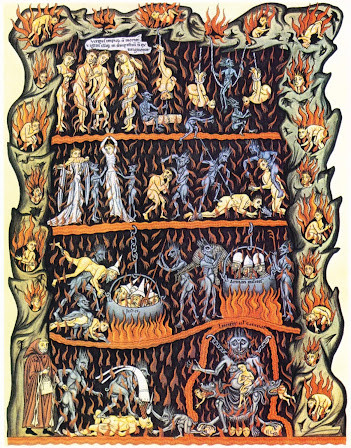A friend asked me about hell ... for a study group.
Here's what I wrote in reply ...
1. In the end, only God … some will stand in that presence and be utterly
joyful … others will stand there, and it will feel like hell … for some, God-in-the-end will be the culmination; for others, it will be the last thing they want.
2. In the end, it’s the culmination of our life’s trajectory … not just of our own doing, but a strange mix of our dirt and divinity, if you will … the primordial will of God to seek and to save the whole of God’s creation, and the day-to-day interaction of God with willful creatures who genuinely have a mind of their own, even when they’re not in their right mind.
3. Like John Steinbeck says, in “East of Eden,” "there are monsters" - you allude to that.
4. Question for me - will God be satisfied if any single creature will be forever barred from peace - as some have suggested: forever burning? Is God’s final will determined by sin, or is sin overcome by God’s final will?
5. Shout what we know: God is love, of a kind more overwhelming than we can ever compute … more pure, more good, more expansive, and creative, than we can imagine or describe.
6. What we don’t know is the fulness of God’s mind - after all, the “knowledge of good and evil” belongs only to God - when we try for it, we die … and then we start killing one another, in fact, or by words.
7. Some forms of Christianity have used hell as a cudgel … a very effective cudgel, to get the sheep in line … but I don’t think it did much good, because it appeals to the basest instinct in human DNA - self-preservation … no matter the cost … in order to “preserve” the self, it feels good to damn others to some everlasting hell, or literally, to take their undeserving life and destroy it.
8. Love is by far the gospel, but it takes a beating … something most American Christians want no part in - hence, the prosperity gospel, the comfort-stuff, and all the other nonsense that focuses relentlessly on the self.
9. There’s a huge difference between covenant-centered Christianity (which generates confidence, peace, and hope) and conversion-centered Christianity (which generates anxiety, pride, judgement of others, and ever-greater self-centered efforts) … conversion-centered Christianity has always relied a great deal on the threat hell, the trump card, if you will. Covenant-centered Christianity relies a great deal on the trustworthy character of God’s love, God’s purpose to save, and the work of Christ to “take away the sin” - not just of the few, but the whole wide world, forever and ever … and that’s why Jesus declared in his final moments, “It is finished.”
10. Sin is not an easy business - it takes an enormous amount of work on God’s part to undo its damages and set a new course - to straighten the road, smooth out the rough places, lower some of the mountains of pride and raise up some of the valleys of despair. Using traditional language, “the harrowing of hell” is God’s ultimate achievement.
11. I’m a universalist … I believe that every last inch of God’s creation will be recreated and made new …
12. Purgatory isn’t entirely a bad idea … for me, it represents a time-lag, if you will, in how it all gets worked out, some sooner, some later, maybe even much later.
13. The Devil’s in the details is evident in how Christianity has dealt with hell … parsing the human race … who’s in, who’s out; who’s saved, who’s damed … and so on … it all ends in a lot of mean-spiritedness …
14. Our task is to love one another … and that means justice and peace …
15. As God has made our eternal future secure (not something to fuss about or worry about), our energies are refocused on the here and now, caring for the Garden, and the needs of the neighbor, and the need, a huge need, to tell historical truth - about all the ills of the world - that’s why CRT is so important to me, and freedom of the press, and well-funded schools.
16. I love the Heidelberg Q/A 1 - that I belong … in Calvin’s Book Three of the Institutes, there are some marvelous passages about “I am not my own, but belong to Christ” …
17. Karl Barth corrected Calvin’s error with “double predestination” - some eternally damned for hell, others for glory, and that’s just the way it is. Rather, says Barth, all the saving and all the damning took place within Jesus the Christ … he was damned, and he was saved … for all the world. It’s our task, our joy, to approach the world with the good news (no fine print here) … some receive it, others reject it, many are somewhere in between.
18. In the end, God! And all will be good … so, as the angels said to the disciples, “Don’t stand there looking up into heaven. Go to Jerusalem … power will come upon you, and then you can get to work.”
I hope these musings make some sense.
Let me know how it goes.
Tom
